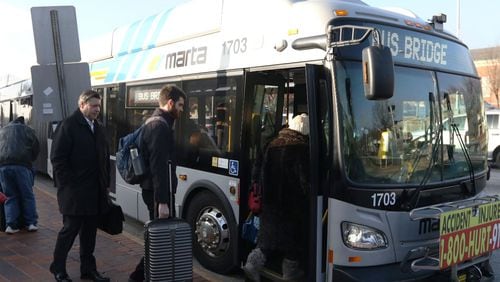MARTA bus and rail operators could be held in contempt of court if they fail to report to work without good cause under an order approved by a Fulton County judge Thursday.
The consent order by Judge Constance Russell also requires Amalgamated Transit Union Local 732 to urge MARTA employees to show up to work, and to refrain from encouraging them to call in sick or otherwise illegally hinder transit operations.
The order — negotiated by MARTA and the union — came on the fourth day of labor unrest that has seen scores of bus drivers call in sick. Though the number has diminished each day, more than 50 drivers called in sick Thursday morning. And at an afternoon court hearing, MARTA attorney Justin Barnes cited a social media post calling for bus and rail operators to skip work Super Bowl weekend.
“Even though these numbers have decreased some, this is still going on,” Barnes told the judge.
MARTA has been negotiating a new labor contract with the ATU. They reached a tentative agreement Saturday. But that apparently has not satisfied some employees — about 130 bus drivers called in sick Monday, followed by 122 Tuesday and 92 Wednesday.
That’s a fraction of MARTA’s 1,199 full-time bus operators and 49 part-timers. But it was enough to disrupt 250 bus routes Monday through Wednesday.
That may have affected thousands of residents who rely on buses to get around. But the sickout has not affected rail service — a key to getting people to and from Super Bowl events this week.
MARTA CEO Jeffrey Parker has said he does not expect labor unrest to affect the Super Bowl. Still, Barnes raised that prospect in court Thursday, as evidence of the urgency of MARTA’s predicament.
MARTA sought a restraining order requiring the union to disavow the sickout and to get back to work. The transit agency said it had evidence that union leaders had coordinated the sickout.
Barnes cited a text message that referred employees to a union vice president for information about the sickout. And he cited a recorded phone conversation — obtained by MARTA — in which a union official allegedly directed a bus driver to call in sick Monday and to claim his personal vehicle had broken down.
“The union has coordinated these efforts,” Barnes told the judge.
ATU attorney Steven Leibel denied the union was involved. He said the ATU has called on employees to report to work. It has posted messages on its Facebook page and distributed leaflets to employees.
“We do not condone it,” Leibel told the judge.
Russell wondered why the parties couldn’t agree on a way to proceed. After huddling in a jury room for nearly two hours, they returned with the court order. Among other things, it stipulates that a sickout or other deliberate work stoppage violates the existing union contract and state law. And both workers and union leaders could be held in contempt if they break the law.
MARTA released a statement after the hearing saying it’s pleased the order “requires the union to reinforce to their members the importance of providing critical transit services to our residents and visitors at all times.”
The union admitted no wrongdoing in the order. After the hearing, Leibel said he’s optimistic union members will heed the call to return to work.
“We’re doing everything we can to make sure that happens,” he said.
Whether or not the labor unrest continues, MARTA may not drop the matter. Before the hearing, Barnes told the union that MARTA intends to fire workers who don’t have a legitimate excuse for calling in sick.
Such firings could be tied up in arbitration for some time.
“This is going to be a really lengthy situation,” Leibel told the judge. “We’ve been told people are going to be deposed all over the place.”








